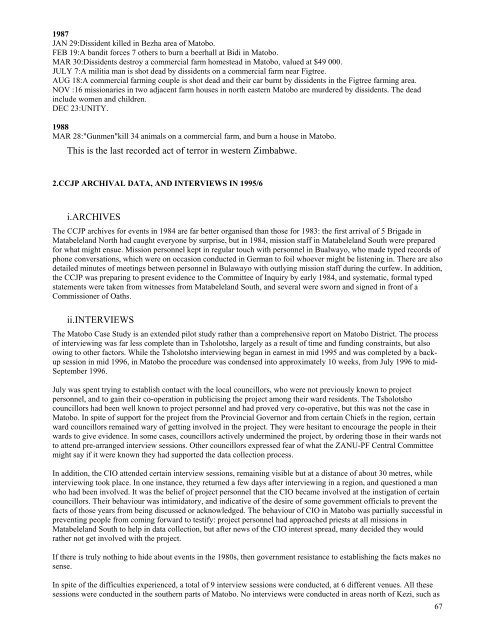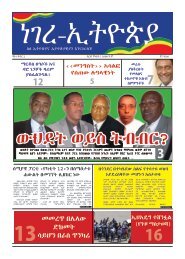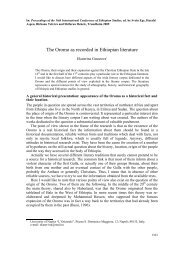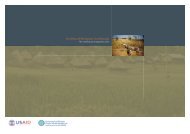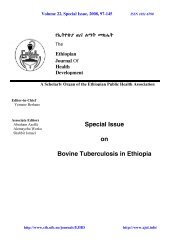MatabelelandReport
MatabelelandReport
MatabelelandReport
Create successful ePaper yourself
Turn your PDF publications into a flip-book with our unique Google optimized e-Paper software.
1987<br />
JAN 29:Dissident killed in Bezha area of Matobo.<br />
FEB 19:A bandit forces 7 others to burn a beerhall at Bidi in Matobo.<br />
MAR 30:Dissidents destroy a commercial farm homestead in Matobo, valued at $49 000.<br />
JULY 7:A militia man is shot dead by dissidents on a commercial farm near Figtree.<br />
AUG 18:A commercial farming couple is shot dead and their car burnt by dissidents in the Figtree farming area.<br />
NOV :16 missionaries in two adjacent farm houses in north eastern Matobo are murdered by dissidents. The dead<br />
include women and children.<br />
DEC 23:UNITY.<br />
1988<br />
MAR 28:"Gunmen"kill 34 animals on a commercial farm, and burn a house in Matobo.<br />
This is the last recorded act of terror in western Zimbabwe.<br />
2.CCJP ARCHIVAL DATA, AND INTERVIEWS IN 1995/6<br />
i.ARCHIVES<br />
The CCJP archives for events in 1984 are far better organised than those for 1983: the first arrival of 5 Brigade in<br />
Matabeleland North had caught everyone by surprise, but in 1984, mission staff in Matabeleland South were prepared<br />
for what might ensue. Mission personnel kept in regular touch with personnel in Bualwayo, who made typed records of<br />
phone conversations, which were on occasion conducted in German to foil whoever might be listening in. There are also<br />
detailed minutes of meetings between personnel in Bulawayo with outlying mission staff during the curfew. In addition,<br />
the CCJP was preparing to present evidence to the Committee of Inquiry by early 1984, and systematic, formal typed<br />
statements were taken from witnesses from Matabeleland South, and several were sworn and signed in front of a<br />
Commissioner of Oaths.<br />
ii.INTERVIEWS<br />
The Matobo Case Study is an extended pilot study rather than a comprehensive report on Matobo District. The process<br />
of interviewing was far less complete than in Tsholotsho, largely as a result of time and funding constraints, but also<br />
owing to other factors. While the Tsholotsho interviewing began in earnest in mid 1995 and was completed by a backup<br />
session in mid 1996, in Matobo the procedure was condensed into approximately 10 weeks, from July 1996 to mid-<br />
September 1996.<br />
July was spent trying to establish contact with the local councillors, who were not previously known to project<br />
personnel, and to gain their co-operation in publicising the project among their ward residents. The Tsholotsho<br />
councillors had been well known to project personnel and had proved very co-operative, but this was not the case in<br />
Matobo. In spite of support for the project from the Provincial Governor and from certain Chiefs in the region, certain<br />
ward councillors remained wary of getting involved in the project. They were hesitant to encourage the people in their<br />
wards to give evidence. In some cases, councillors actively undermined the project, by ordering those in their wards not<br />
to attend pre-arranged interview sessions. Other councillors expressed fear of what the ZANU-PF Central Committee<br />
might say if it were known they had supported the data collection process.<br />
In addition, the CIO attended certain interview sessions, remaining visible but at a distance of about 30 metres, while<br />
interviewing took place. In one instance, they returned a few days after interviewing in a region, and questioned a man<br />
who had been involved. It was the belief of project personnel that the CIO became involved at the instigation of certain<br />
councillors. Their behaviour was intimidatory, and indicative of the desire of some government officials to prevent the<br />
facts of those years from being discussed or acknowledged. The behaviour of CIO in Matobo was partially successful in<br />
preventing people from coming forward to testify: project personnel had approached priests at all missions in<br />
Matabeleland South to help in data collection, but after news of the CIO interest spread, many decided they would<br />
rather not get involved with the project.<br />
If there is truly nothing to hide about events in the 1980s, then government resistance to establishing the facts makes no<br />
sense.<br />
In spite of the difficulties experienced, a total of 9 interview sessions were conducted, at 6 different venues. All these<br />
sessions were conducted in the southern parts of Matobo. No interviews were conducted in areas north of Kezi, such as<br />
67


